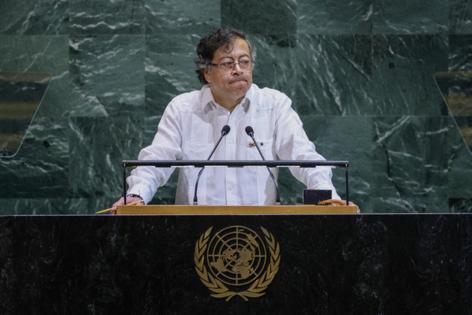Trump targets Petro while leaving Colombian business unscathed
Published in News & Features
President Donald Trump’s decision to sanction President Gustavo Petro may look bad for Colombia, but it’s hardly the worst outcome for businesses that were bracing for economy-crushing tariffs.
On Friday, the U.S. Treasury Department effectively barred Petro and members of his inner circle from using the U.S. financial system or doing business with U.S. companies for allegedly enabling drug trafficking.
Yet Colombian companies and workers have so far been relatively unscathed. A group of business leaders sought direct contact with U.S. officials to help persuade Trump that his dispute with Petro shouldn’t lead him to target a country that has historically been a close ally.
Even so, Trump is impulsive about imposing and canceling tariffs, and has already once ordered tariffs on Colombia in a migrant dispute in January before pulling back within days.
Businesses in Brazil have similarly worked to open their own channel of communication with the Trump administration after the U.S. president imposed sweeping tariffs on their country, with some signs of success. Trump said Friday he expected to meet with Brazilian President Luiz Inacio Lula da Silva and that he was open to lowering U.S. tariffs.
Those efforts show a potential road map for companies exporting from countries whose governments are at odds with the White House.
‘Commercial diplomacy’
“Colombian entrepreneurs have been doing their own commercial diplomacy,” said Muni Jensen, founder of Washington-based Goldleaf Advisors, which consults on political and public affairs. “This is a template other countries can surely learn from.”
Those efforts began after the January flareup when Trump threatened tariffs of as much as 50% on all Colombian goods after Petro’s initial refusal to accept U.S. military planes carrying deported migrants. While that dispute was quickly resolved, it shocked the private sector, which realized that it lacked channels of communication with the people running the largest market for Colombia’s oil, coffee and flowers.
They set out to fix that, María Claudia Lacouture, head of the Colombian-American Chamber of Commerce, or AmCham, said before the sanctions were announced.
“The relation between two countries goes beyond that of their governments,” said Lacouture, who has been traveling between the two capitals in a bid to prevent the leaders’ dispute from affecting Colombia’s access to its most important trading partner.
The nation’s biggest business group, ANDI, was also involved in the effort, as were former presidents, former diplomats and associations representing individual export sectors. The groups met with officials from the U.S. State Department, trade officials, lawmakers and business chambers.
“The success so far is producing that clear differentiation, between Colombia and Gustavo Petro,” ANDI’s head Bruce Mac Master said in an interview Friday, before the sanctions had been announced.
Trump has targeted dozens of countries with tariffs, either because he said he was trying to level the playing field or because of disagreements with their leaders, as in the case with Petro.
Even so, Colombia may not be out of the woods yet, according to Juan Cruz, who as senior director for Western Hemisphere affairs at the White House National Security Council, from 2017 to 2018, was a top adviser to Trump on Latin American issues.
“In the region, Trump is interested in migration, counter-drugs and counter-China, and Petro has been lousy on all three,” Cruz said. “I wouldn’t take anything off the table.”
And as Colombia prepares for elections next year, Petro will probably continue to “deliberately rile Trump,” said Nicholas Watson, managing director of risk consultancy firm Teneo. Petro is ineligible for reelection, but is seeking to a victory for his leftist allies.
“The question is how long this lobby urging pragmatism and the preservation of relations can remain effective,” Watson wrote in a note.
Petro stepped up his criticism of U.S. policy in recent days, calling strikes on alleged drug boats, which have killed about 40 people, “murder” and “genocide.” Last month, the U.S. canceled his visa after he called on troops to disobey Trump’s orders.
This month, Trump called Petro an “illegal drug leader,” and said he would halt all aid.
The Andean nation has received about $14 billion in U.S. aid this century, including military assistance to battle drug cartels and Marxist rebels.
_____
©2025 Bloomberg L.P. Visit bloomberg.com. Distributed by Tribune Content Agency, LLC.







Comments